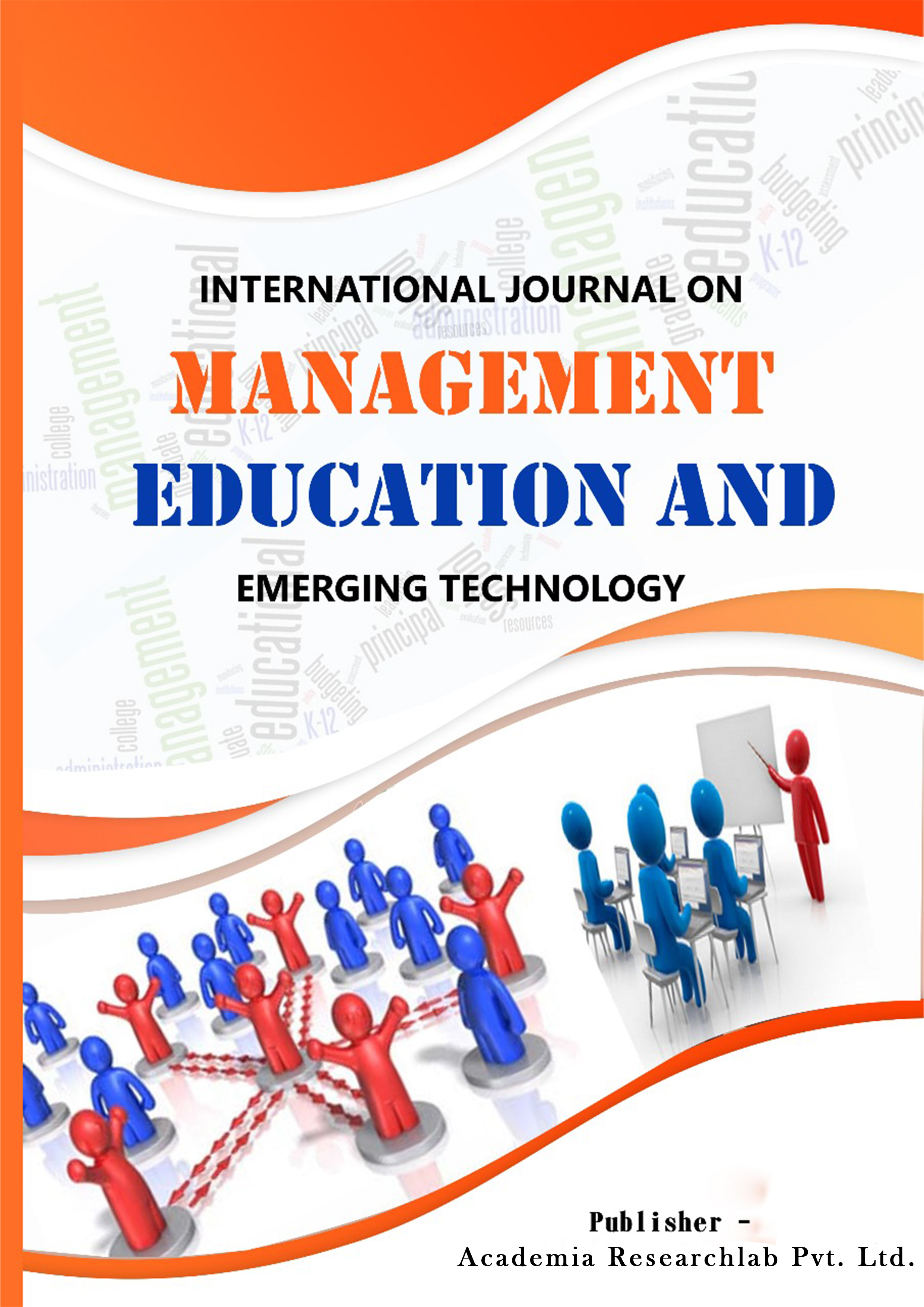Investigating The Influencing Factors On Students’ Behavioral Intention To Adopt E-Learning In Private Libyan Universities
Keywords:
E-learning adoption, Behavioural intention, (TAM), (TRA), (TPB), Private Libyan Universities, Subjective Norms, Attitude Towards E-learning, Actual Use, Expected Ease of Use, Expected BenefitAbstract
The study examined the influence of factors on students’ behavioral intentions to adopt e-learning in private Libyan universities. To achieve this, the mediating variable was added, which is actual use. Research gap: Research on the adoption of e-learning in Libyan private universities is limited, with the factors of tangible benefit, ease of use, subjective standards and attitude towards e-learning not being fully explored. Local challenges such as infrastructure issues, cultural attitudes toward online education and faculty readiness and institutional support for students to adopt e-learning have also not been fully explored. The researcher uses the technology acceptance model, the theory of rational action, and the theory of planned behavior to identify the main determinants. The literature was reviewed in light of the study variables. The study relied on descriptive survey research using random sampling technique. The experimental sample for the study consisted of 35 respondents from students at private Libyan universities. A questionnaire was used to collect data. The results showed that the percentage of males was 80% greater than that of females. The result also showed that there is a large difference between students in terms of age, as the highest percentage was between 30-40 years. This is because those who use e-learning the most are bachelor’s students and postgraduate students, which greatly affects the efficiency in using e-learning tools. The study aims to enhance services. E-learning is a response to modern organizations that prioritize efficient service delivery. Future research should explore student and faculty experiences, government policies, and external factors such as COVID-19. The study recommended the necessity of using technology in teaching and learning to raise the level of independent learning among students.
References
Aburagaga, I., Agoyi, M., & Elgedawy, I. (2020). Assessing Faculty’s Use of Social Network Tools in Libyan Higher Education via a Technology Acceptance Model. IEEE Access, 8, 116415–116430. https://doi.org/10.1109/ACCESS.2020.3004200
Abusef, A., & Kumar Tarofder, A. (2021). Investigating the influencing factors on student’s behavioral intention to adopt e-management in Libyan universities. Journal of Global Business and Social Entrepreneurship (GBSE), 7(20), 41–51. www.gbse.com.my
Agyemang, M. (2022). A Perfect Marriage for The “Millennials” in Higher Education: COVID-19 and Blended Learning. c, 0–1.
Aini, Q., Budiarto, M., Putra, P. O. H., & Rahardja, U. (2020). Exploring E-learning Challenges During the Global COVID-19 Pandemic: A Review. In Jurnal Sistem Informasi (Vol. 16, Issue 2, pp. 57–65). https://doi.org/10.21609/jsi.v16i2.1011
Ajzen, I., & Fishbein, M. (1975). Ajzen_Fishbein.Bayesianattribution.PsychBull1975.pdf.
Al-Bakri, G. bint S. (2022). Problems facing teaching art education remotely in light of the Corona pandemic from the point of view of subject teachers.
Al-Ghanim, A.-D. K., & Al-Turki, O. T. (2022). Factors affecting deaf students’ use of e-learning TAM Technology Acceptance Form.
Alsahou, H., Abbas, Z., & Alfayly, A. (2022). The Attitude Of Undergraduates Towards E-Learning Considering Educational And Technical Challenges And Requirements In Kuwaiti Applied Colleges. In Journal of Technology and Science Education (Vol. 12, Issue 1, pp. 33–49). https://doi.org/10.3926/jotse.1358
an minh ngoc pham. (2023). Students’ Perceptions on Blended Synchronous Learning in the Postcrisis Era
.pdf.
Asra, S. A., & RKAR. Kariapper. (2023). MODERN TRENDS OF E-LEARNING DURING COVID-19 PANDEMIC.
Brown, S. A., Venkatesh, V., & Hoehle, H. (2015). Technology adoption decisions in the household: A seven- model comparison. Journal of the Association for Information Science and Technology, 66(9), 1933–1949. https://doi.org/10.1002/asi.23305
Davis, F. D. (1989). Mobile_Money_decryptage_dune_succes_story_africai.pdf.
Davis, F. D. (1993). User acceptance of information technology: system characteristics, user perceptions and behavioral impacts. In International Journal of Man-Machine Studies (Vol. 38, Issue 3, pp. 475–487). https://doi.org/10.1006/imms.1993.1022
Fichman, R. (2004). Going Beyond the Dominant Paradigm for Information Technology Innovation Research: Emerging Concepts and Methods. Journal of the Association for Information Systems, 5(8), 314–355. https://doi.org/10.17705/1jais.00054
Kane, R. T., & Dahlvig, J. (2022). Traditional Faculty Resistance to Online Higher Education. In American Journal of Qualitative Research (Vol. 6, Issue 2, pp. 1–16). https://doi.org/10.29333/ajqr/12125
Kiely, A., Kilgore, S., & Cumbass, K. (2020). Covid-19 (p. 1of 25). https://doi.org/LEAD, Team; KIELY, Andrea. The Pentorship Project.
Krishnan, K. A., & Din, R. (2023). Pengaplikasian E-Pembelajaran Dalam Proses Pengajaran Dan Pembelajaran Dalam Kalangan Pensyarah Di Kolej Vokasional Port Dickson ( E-Learning Application In Teaching And Learning Among Lecturers Of Port Dickson Vocational College ). 5(1), 10–18.
Ly Thi Ngoc Linh, Nguyen Thi Lam, N. H. N. (2021). Using E-Learning Platforms in Online Classes: A Survey on Tertiary English Teachers’perceptions. 12(5), 1–23.
Rahmawati, R. N. (2019). Self-Efficacy and Use of E-learning: A Theoretical Review Technology Acceptance Model (TAM). American Journal of Humanities and Social Sciences Research, 5, 41–55. www.ajhssr.com
Rawashdeh, A. Z. Al, Mohammed, E. Y., Arab, A. R. Al, Alara, M., & Al-Rawashdeh, B. (2021). Advantages and disadvantages of using E-learning in university education. In Electronic Journal of e-Learning (Vol. 19, Issue 2, pp. 107–117). https://academic-publishing.org/index.php/ejel/article/view/2168
Taherdoost, H., Business, H., Sdn, S., Group, C., & Lumpur, K. (2016). Sampling Methods in Research Methodology ; How to Choose a Sampling Technique for. International Journal of Academic Research in Management (IJARM), 5(2), 18–27.
Teo, T. (2010). A path analysis of pre-service teachers’ attitudes to computer use: Applying and extending the technology acceptance model in an educational context. Interactive Learning Environments, 18(1), 65–79. https://doi.org/10.1080/10494820802231327
Viswanat h Venkat esh, F. D. D. (2000). Venkatesh_Davis_2000_Mgt_Sci.pdf.
Additional Files
Published
How to Cite
Issue
Section
License
Copyright (c) 2024 International Journal on Management Education and Emerging Technology(IJMEET)

This work is licensed under a Creative Commons Attribution-NonCommercial-NoDerivatives 4.0 International License.





